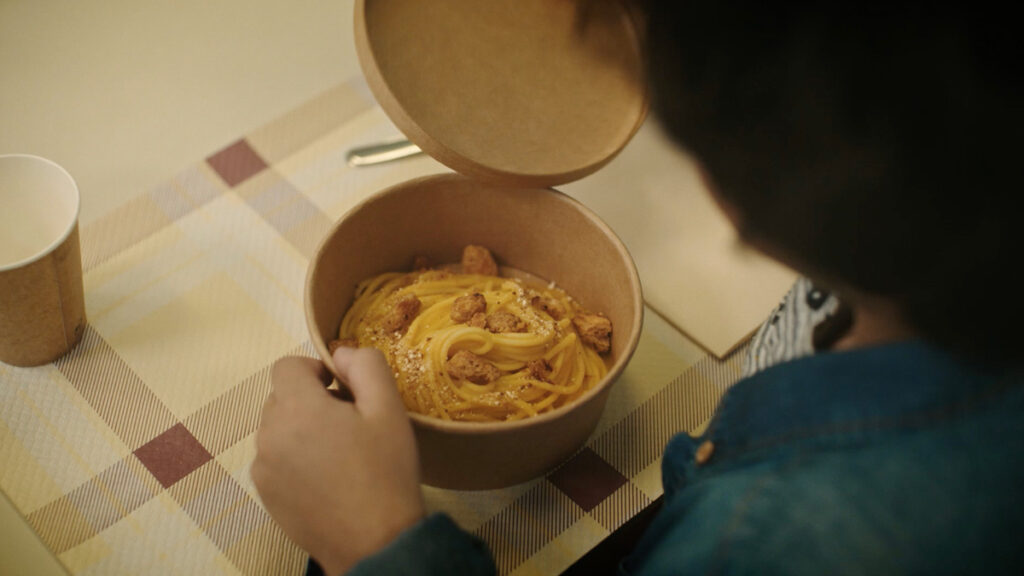Not Your Nonna’s Carbonara: Why Barilla Dared to Reinvent an Italian Food Classic
Driving relevance means driving growth. Join global brands and industry thought leaders at Brandweek, Sept. 11–14 in Miami, for actionable takeaways to better your marketing. 50% off passes ends April 10.
With a celebrated food culture, Italy is known for protecting its culinary traditions even as many of its recipes have transcended borders.
So some food lovers may be surprised that pasta brand Barilla is shaking up one of Italy’s best-known dishes: carbonara.
Coinciding with National Carbonara Day April 6, Barilla has launched an initiative called Open Carbonara, which offers up a cross-cultural rendition of the Italian classic. Created by Publicis Italy, the campaign promotes food inclusivity, as the brand’s research reveals that 58% of people say they face some form of limitation when it comes to eating.
Traditional carbonara is a dish of Roman origin, prepared with spaghetti, guanciale (cured meat made from pork cheek), pecorino Romano, eggs and pepper. These ingredients mean the dish is not suitable for those who observe halal, kosher, vegan, gluten-free or lactose-free diets.
This issue comes to light in Barilla’s short film, which follows a group of children at an Italian school. When the kids sit down for lunch, most of them are served carbonara, but a few with dietary restrictions receive a different dish—and feel left out among their peers.
One of the girls goes home and tells her dad that she won’t eat carbonara anymore because her friend Gabriele can’t have it. Her father happens to be Michelin-starred chef Marco Martini, and the children’s wish inspires him to create “a much more inclusive carbonara.”
Martini and a team of six international chefs specializing in halal, kosher and vegan cuisines created an alternative version of the classic pasta recipe. Its ingredients are gluten-free spaghetti, saffron, potatoes, celeriac, soy flakes, pepper and olive oil–all curated to preserve the integrity, texture and flavor of the original version.
Barilla has released the recipe to the public through a new platform titled Open Recipes–and it won’t stop with carbonara. The site features 140 pasta recipes suitable for various diets, and the brand will continue to add more alternative versions of traditional dishes that cater to as many dietary needs as possible.
For the next week, Barilla’s Open Carbonara recipe will also be available to try at London’s Darjeeling Express restaurant, recreated by Chef Asma Khan.

Bridging food gaps
It is widely said that food brings people together, but Barilla’s survey found that 43% of respondents admit they do not invite friends or family over for a meal because of the challenge of catering to different dietary requirements. Yet, 36% said they feel closer to their guests at mealtimes when they are sharing the same dish.
Ilaria Lodigiani, chief marketing officer at Barilla, told Adweek she was surprised by the discovery that “one of the most common places where one may feel excluded is around the dining table.” That is why the brand and Le Pub decided to reinvent one of Italy’s gastronomic icons.
“As a leading food brand, we have the responsibility to promote food inclusivity and challenge ourselves to bridge the gap … to make food even more a sign of love to be shared and enjoyed with loved ones, no matter their needs,” she added.
Barilla has “navigated dietary and societal changes to keep pasta a relevant, contemporary dish” throughout its history, explained Bruno Bertelli, global CEO of Le Pub, global CCO of Publicis Worldwide and CCO of Publicis Groupe Italy.
“For us, reinventing the traditional recipe into a version open to everyone is a powerful act to spread a wider message on the importance of making our table more inclusive and welcoming for everyone,” said Bertelli. “We strongly believe that in a world that is becoming every day more and more inclusive, our way of cooking should too.”
CREDITS:
Publicis Italy
Global CEO Le Pub, Global CCO Publicis Worldwide, CCO Publicis Groupe Italy: Bruno Bertelli
CCO Publicis Italy: Cristiana Boccassini, Mihnea Gheorghiu, Francesco Poletti
Global Executive Creative Director: Riccardo Fregoso, Selim Unlusoy
Associate Creative Director: Daniela De Seta, Alessandro Agnellini
Art Director Supervisor: Andrea Raia
Copywriter Supervisor: Matteo Gatto
Head of Strategy: Niccolò Rigo
Senior Experience Strategist: Antonio Jorgaqi
Senior Digital Strategist: Margherita Tuvo
Data Strategist: Andrea Battista
Social Media Analyst: Alberto Mura
Junior Data Analyst: Federica Parisi
Global Client Service Director: Simona Coletta, Federica Papetti
Account Supervisor: Roberta Di Ponzio
Account Executive: Giovanni Spadola
Global Head of PR and Communication: Isabella Cecconi
Digital PR Manager: Carol Verde
PR Manager: Eleonora Botta
Head of Social and Content: Valentina Salaro
Senior Social Media Manager: Remigio Guerriero
Chief Creation Officer: Francesca Zazzera
Senior TV Producer: Antonella Capella
TV Producer Assistant: Eva Maio
Head of Digital Production: Vittorio Cafiero
Digital Project Manager: Ornella Scarparo
Head of Creative Technology: Mauro Mazzei
Digital Designer: Serena Murgia
Production and print managers: Tina Paolella, Daniela Inglieri
Progress Managers: Elisa Petrone, Alessia Cornali
Music Title: JERUSALEMA (feat. Nomcebo Zikode)
Author: Kgaogelo Moagi, Nomcebo Nothule Nkwanyana
Master: Master KG feat Nomcebo Zikote
Music Company: Warner Music France / Africori
Original Score: Magma Music Agency
Music Supervision: Michael Bertoldini
https://www.adweek.com/brand-marketing/not-your-nonnas-carbonara-why-barilla-dared-to-reinvent-an-italian-food-classic/
